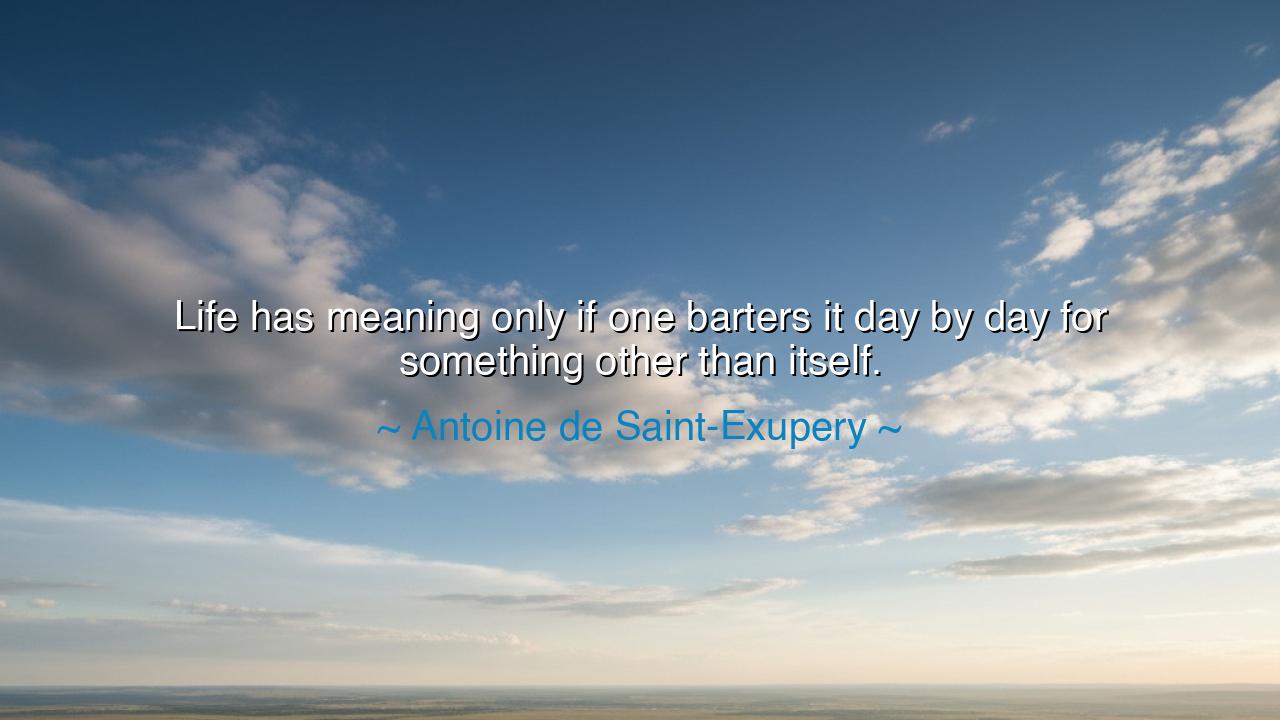
Life has meaning only if one barters it day by day for something






“Life has meaning only if one barters it day by day for something other than itself.” – Antoine de Saint-Exupéry
These words, spoken by Antoine de Saint-Exupéry, the aviator, writer, and dreamer who gave the world The Little Prince, carry the weight of both sky and soul. To barter life for something beyond itself is to give of one’s breath, one’s strength, and one’s moments to a purpose greater than survival. It is to recognize that life, by itself, is raw material — precious, yes, but incomplete — and that meaning is forged not by what we keep, but by what we offer. Saint-Exupéry, who risked his life soaring through dangerous skies, knew well that existence without service, beauty, or love becomes an empty shell. He teaches us that the value of life is measured by its exchange — by what we dare to give away.
In the time of the ancients, the philosophers spoke of virtue and sacrifice as the true currencies of the soul. To live only for oneself was to live half a life, a flickering flame protected from the wind but never allowed to blaze. Saint-Exupéry, though born centuries later, carried the same wisdom in modern form. A pilot in both war and peace, he saw from above the smallness of human borders and the greatness of human spirit. His words are the voice of a man who had looked down upon the Earth and realized that meaning cannot be hoarded — it must be shared, traded each day in acts of creation, service, and love.
To barter life is not to waste it recklessly, but to spend it wisely. The merchant of meaning does not seek profit in gold or glory; he seeks it in giving. Consider the story of Mother Teresa, who left behind comfort and reputation to serve the dying and forgotten in the slums of Calcutta. Her life was a daily exchange — time, energy, and compassion traded for human dignity, for the relief of another’s suffering. She did not preserve her life like a treasure to be guarded; she spent it freely. And in that giving, she found what Saint-Exupéry called meaning — something other than life itself, something eternal.
Saint-Exupéry’s own life was a reflection of his creed. Born into privilege, he could have chosen safety and ease, but instead he chose the winds — the open skies that demanded courage, endurance, and solitude. As a pilot, he faced storms and mechanical failures, yet he spoke of flying as communion with the infinite. He once said that “love is not gazing at one another, but looking outward together in the same direction.” That outward gaze — toward service, toward purpose — is the same gaze that gives life meaning. When he disappeared over the Mediterranean in 1944, his body lost to the sea, it was as though his life had been fully bartered — traded to the sky itself for a legacy that still uplifts hearts today.
This truth, however, demands bravery. To live meaningfully is to resist the temptation of comfort and self-preservation. The one who clings too tightly to life, who measures days only by their safety or pleasure, discovers too late that he has lived without truly living. Life kept for itself decays like hoarded bread; life given away multiplies like loaves shared among the hungry. Saint-Exupéry’s teaching is a call to courage — a reminder that purpose is the soul’s true nourishment, and that it is found not in accumulation, but in contribution.
The lesson is this: each sunrise is a bargain awaiting your answer. You may keep the day for yourself, or you may barter it — trade your time for kindness, your labor for creation, your words for encouragement, your heart for love. Whatever you give freely returns transformed, and it is in that transformation that you will find peace. The meaning of life is not to possess it, but to offer it — again and again, until the final breath has been spent in the service of something beautiful.
So, walk through the world as both merchant and poet. Let your days be coins of light, exchanged not for comfort but for legacy. Create, give, build, forgive, and love — for these are the currencies that enrich eternity. And when your time comes to rest, may it be said of you, as it could be said of Saint-Exupéry himself: this one did not hoard his days, but bartered them bravely, until every breath was transmuted into meaning. For truly, life has meaning only when it is lived for something beyond itself.






AAdministratorAdministrator
Welcome, honored guests. Please leave a comment, we will respond soon